Attempting change from within
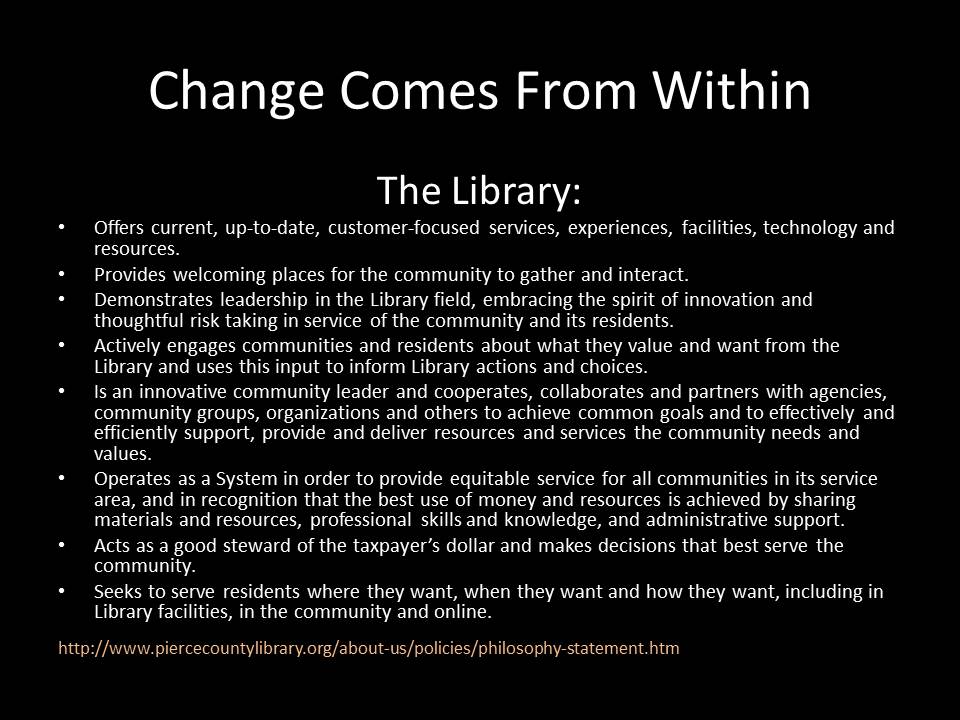
So the library needs to make some changes to its underlying models if it wants to continue operations and not be consigned to the dust bins of history. For some of us, that means re-evaluating what we're saying in our mission statements and our philosophies. I like to pick on my own institution, because I like them and want them to do better, and because I have firsthand experience with how things go (or don't) with ideas, so here's what my library says in our Philosophy Statement (from 2016, superceded by other items - Future Self):
The Library:
- Offers current, up-to-date, customer-focused services, experiences, facilities, technology and resources.
- Provides welcoming places for the community to gather and interact.
- Demonstrates leadership in the Library field, embracing the spirit of innovation and thoughtful risk taking in service of the community and its residents.
- Actively engages communities and residents about what they value and want from the Library and uses this input to inform Library actions and choices.
- Is an innovative community leader and cooperates, collaborates and partners with agencies, community groups, organizations and others to achieve common goals and to effectively and efficiently support, provide and deliver resources and services the community needs and values.
- Operates as a System in order to provide equitable service for all communities in its service area, and in recognition that the best use of money and resources is achieved by sharing materials and resources, professional skills and knowledge, and administrative support.
- Acts as a good steward of the taxpayer's dollar and makes decisions that best serve the community.
- Seeks to serve residents where they want, when they want and how they want, including in Library facilities, in the community and online.
Not bad, yeah? It's a lovely, lofty goal. And if we can achieve this, we'll be rock stars.
BUT…
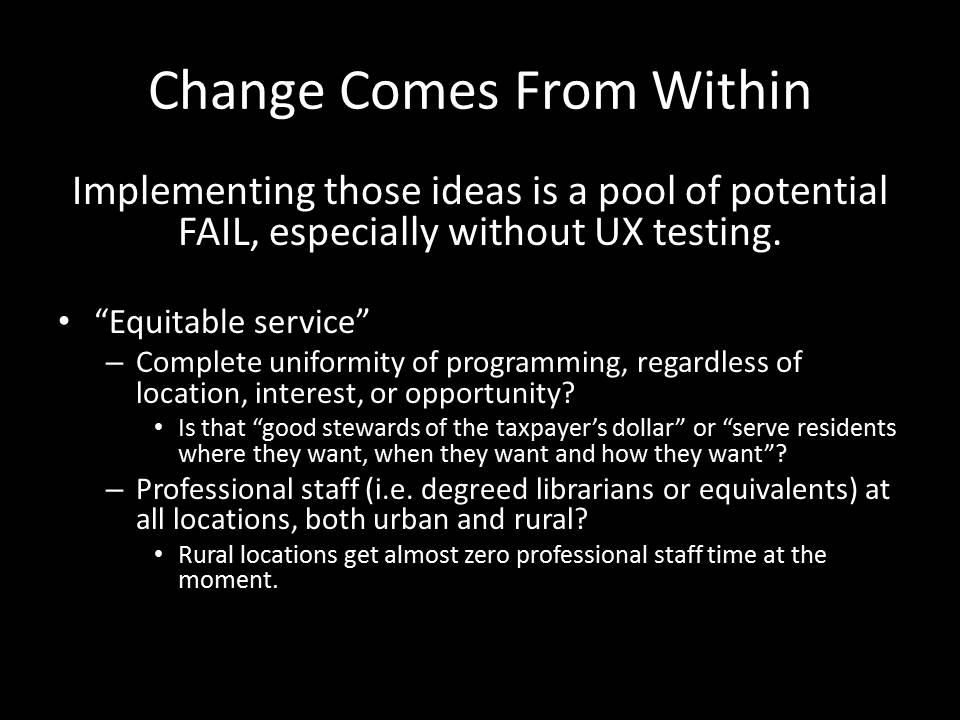
Implementation is one of those ways that you can royally screw up even the best ideas, as someone who works in UX testing could tell you. Take, for example, the idea of "equitable service". That could mean we're striving to provide the same kinds of experiences at our most far-flung, rural branch communities as we are in our urban zones. As our numbers will tell you, though, one program may be wildly popular in one community and have zero attendance in the next, whether it's intended for adults, teenagers, tweenagers, kids, families – you name it, we have variances in our statistics for attendance and interest. According to our philosophical statements, though, if we want to provide "equitable service", that suggests we may not necessarily take those regional variances into account and tailor our programming ideas to those things that are interesting. Which is a waste of time and resources. Not exactly "good stewards of the taxpayer's dollar" or "decisions that best serve the community." And it's certainly not giving people services where they want, when they want, and how they want.
Additionally, our far-flung regional locations are usually smaller in size, collection, and population. "Equitable service" would mean having a proper proportion of professionals for their needs and community, so that they received the same high-quality service that our larger, more metropolitan communities get. They don't. At our smallest locations, there's not a guarantee that there will be a degreed librarian working the reference desk to answer questions. Most of them get a visit from a Youth librarian once a week to take care of collection matters and maybe squeeze in a program. It's nothing approaching "equitable service", and it's certainly not the good kind of inequitable, where things are tailored to the needs of the community around.
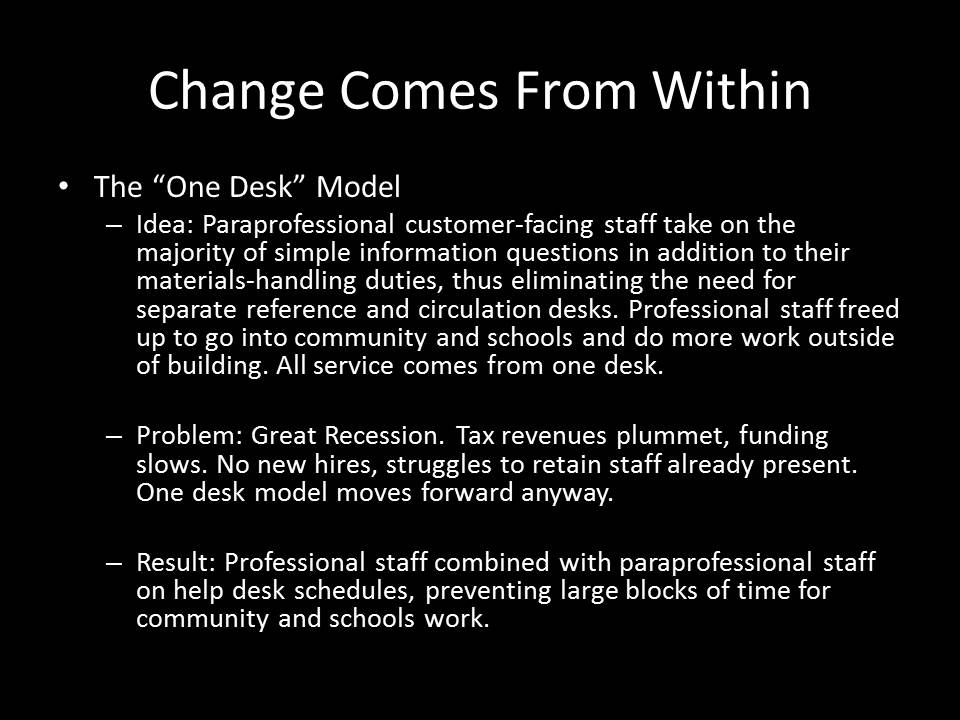
To my organization's credit, though, they recognized things weren't working, and constructed a new service model, collapsing what were many desks in many places in the buildings into a single desk in each building where all functions could be taken care of and questions answered. The idea was to be able to free up the degreed librarians to pursue more programming options, community and school contacts, and to be able to do the in-depth think-work that produces really good library service. Non-degreed staff would be trained in how to answer most basic reference questions in addition to their duties regarding handling people accounts, monies, and the less glamourous tasks of running a library.
And then the recession hit. This had the general effect of soaking all those paper cuts the library was suffering from in salt brine. The single-desk model went forward, but instead of librarians having lots of non-public time to plot and go out into the community soliciting information and doing cool things, the librarians were used to fill holes in the desk model, and a new model emerged that, at those institutions that had them, at least one degreed librarian would have to be on the floor during all the hours the library was open. This fragmented the librarians' schedules and often achieved the opposite effect than the one that was intended with the single-desk model.
Once again, a charitable description of the results might be explained as: Today's experiment…failed.
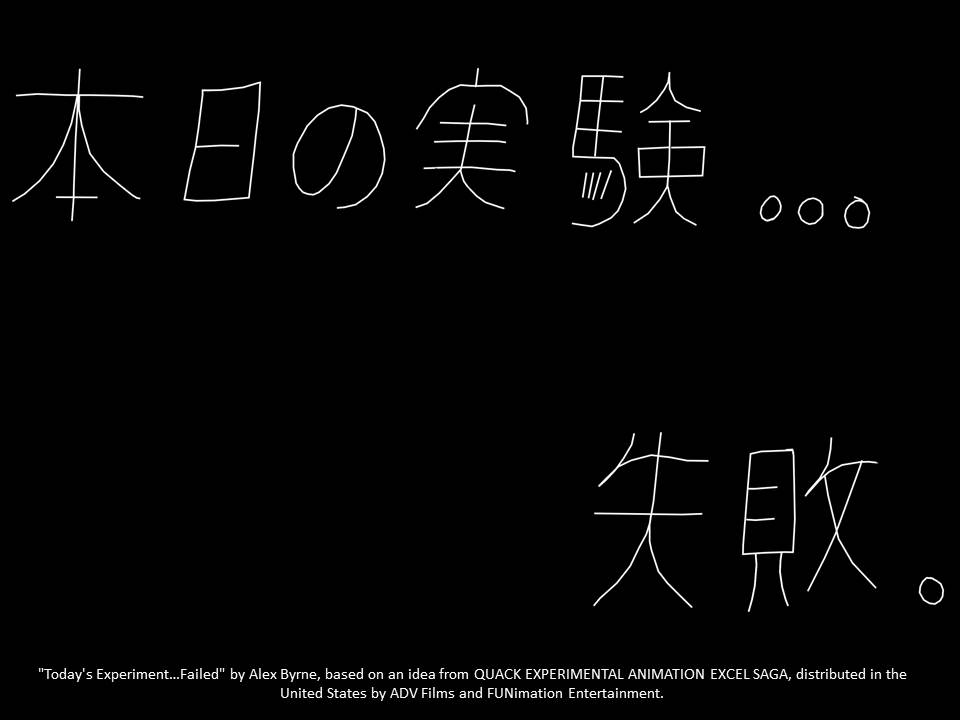
Encouraging Change From Without
Open-sourcing public libraries means open-sourcing the buildings, the website spaces, the collections, and the governing philosophies and procedures. They should be community-driven entities and provide clear "source code" and documentation of what they do and how they do it, for the community to then take, study, fix flaws and bugs, remix, and then submit back to the library for inclusion in the next iteration. To do that, though, we need a community that takes an active interest in their public library, and is willing to work on all of those issues from the outside perspective, to work with the staff on the inside that are trying to make their libraries better than they are now.
Expect More
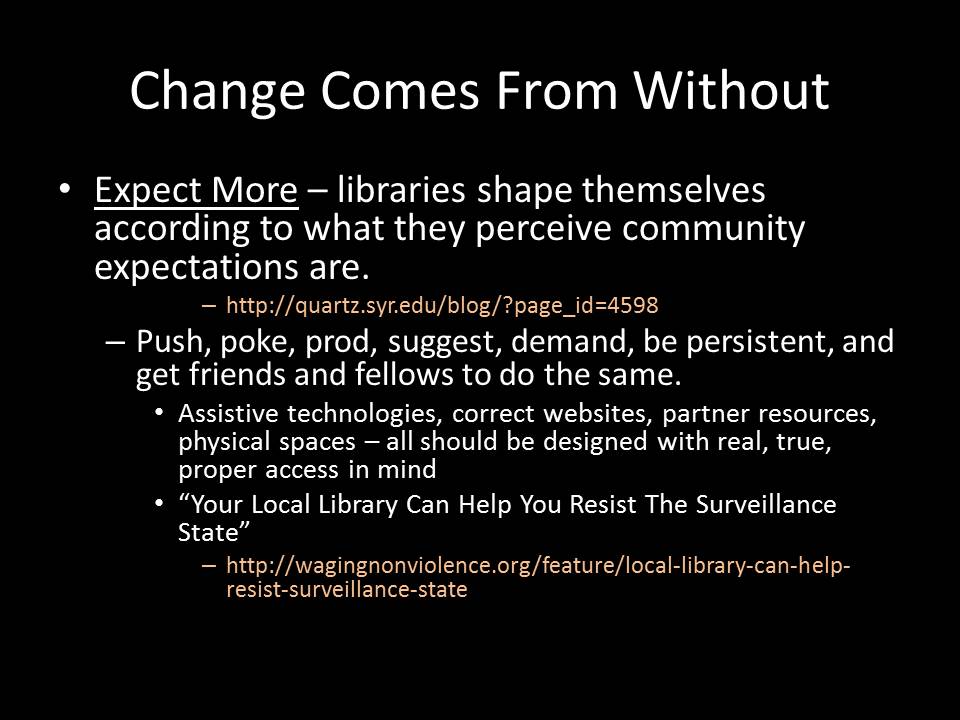
What would a public library be like if everyone that came in and used it had a suggestion on how it could be improved? And even more, what if everyone who came in to the library not only had a suggestion, but was comfortable making that suggestion to the library staff? And even better, what if the library could take those suggestions and adapt themselves to be able to better serve the people who use library services?
David Lankes argues in Expect More that public library users need to insist that their libraries be proactive about meeting the challenges of tomorrow, on issues like user privacy, intellectual property, and other things that are important to the community. The more you push, poke, and prod your library to think less about being merely a content delivery source (where they will die the death of a thousand paper cuts to all the other content delivery systems that are faster, stronger, and better able to serve the needs of a consuming public) and more about a content creation source, contributing unique and highly relevant things to the community and region around them (and perhaps even the nation and the world), in partnership with that same community that the information and creations are intended for, the more likely it is that not only will your public library become more relevant to you and your interests, it will be better-positioned to absorb the changes of the future and continue to deliver excellent quality to the community around it.
Why doesn't your public library have a LibraryBox installation? A Disapora* pod? A process by which they purchase the digital content they lend out to you, instead of merely renting it from a provider who can (and does) arbitrarily jack up the prices every time they need a new cash infusion? Part of it may be they don't know such things exist. Part of it may be they don't think they have the expertise to set it up and maintain it. And part of it may be that they believe the community doesn't want it. You can help change their minds on those issues by expecting the public library to have those things, and to make the investment in time and staff to provide them.
Public libraries have the potential to be about more than just materials and cataloging techniques and technology that allows people to find the materials that have been purchased, and more than just places where someone goes to get free Internet access. They could even become places that actively provide methods (and education about said methods) to make it difficult for snooping entities to capture their data. What would happen if public libraries lived up to the promise of "Your Local Library Can Help You Resist The Surveillance State" by adopting the best software installations and practices from our communities? At least part of the issue in the way is inertia. It's not cheap to retrofit all the computers with new operating systems, software suites, and to do the training that would be necessary, for staff and the public, to really embrace the idea of the library as a secure and private computing zone. Even if the long-term savings are astronomical, the momentum needed to make changes can be substantial. If the community around us, though, starts pushing hard for this to happen, then the public library will change. If the community around us can provide us with solutions to the problems that will develop from adopting this firm commitment to privacy, the library will change faster.
A public library has a commitment to access to everyone. That should mean everyone – those of differing physical and mental abilities, socioeconomic classes, language proficiencies, ages, races, and creeds. That should be so in our physical buildings, in our virtual spaces, in our outreach efforts, and in everything we do. A public library will build the minimum required for access according to the codes and laws in place in their community, and then perhaps with some thought about other things afterward, if they have someone handy who can help them with the relevant issues. (Not always, though – those in charge of building where I currently work solicited, and then gave the appearance of ignoring, the suggestions of the staff that would be working there about how to construct the building. Not a good idea.) If there's something about your library space that is inconvenient or that presents a possible barrier to access, tell us and expect us to fix it. If there's something about the library website, or any of our partner resources, that is inconvenient or presents a barrier to access, tell us and expect us to either fix it or put pressure on the people we're buying from to fix it. Be civically active and get your local government and library board to go beyond federal requirements for accessibility. Harangue us about adopting design principles that work for everyone. Then follow up with us. And bring friends who are similarly inconvenienced. Bring pressure on social media, at board meetings' public comment periods, in the news. Keep pushing on us until we change, or until we give a real reason to why we can't. (Even then, keep pushing.)
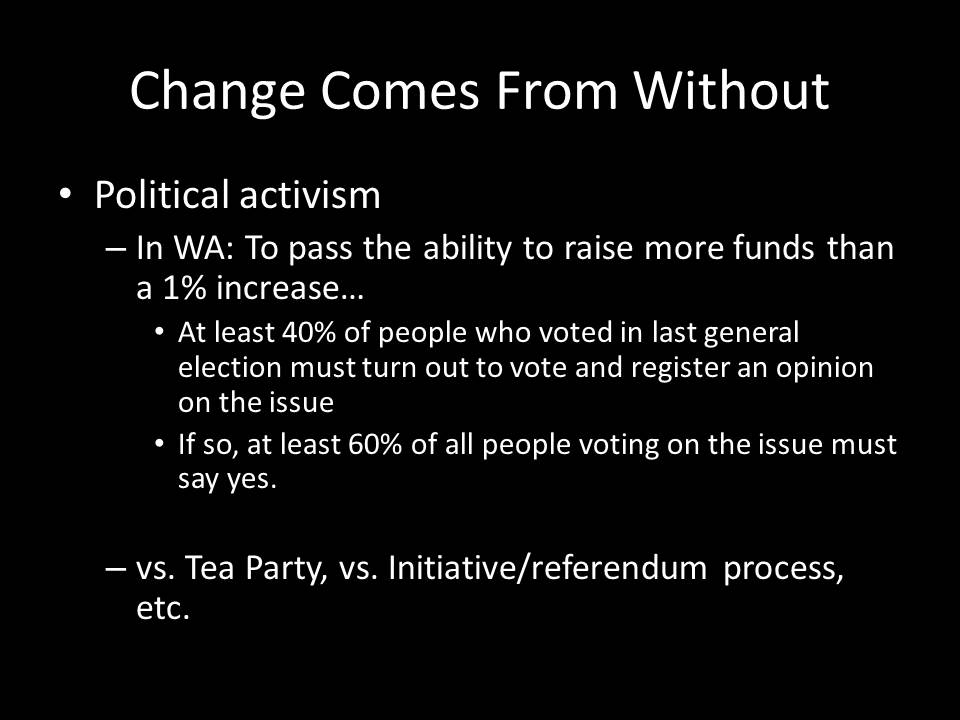
If the reason you get is "no budget", then you may have to advocate for us to be able to increase our available monies before we can continue on the path to being open-source. Here's a secret about library funding: it's really hard to get. In Washington State, where I'm headquartered, if the library wants to pass any issues regarding raising bond money or trying to take advantage of a good economy to raise more money and deliver more services, the library first has to get 40% of the people who turned out to the last general election to vote on the issue, regardless of whether they say yes or no. If the library manages that, then the library has to convince 60% of the total people who have voted on the issue that they want to pony up the additional tax money. So the library not only has to motivate enough people to get out and vote, we then have to convince a supermajority of those who do vote to approve more funding for us. Let's put it this way – it's already hard enough for the library to convince people to keep them funded. Even more so in an environment where a significant number of people believe all taxes are evil and should be abolished, regardless of what services or benefits they generate. A public library has a vested interest in not generating additional heat against them. In some unfortunate cases, that may be a greater motivator for a public library to change than the desire for the library to be an institution that truly reflects its community.
Expect more from your public library, and they will try their hardest to meet your raised expectations. Otherwise, they're screwed, and they know it. (Or they should, anyway.)
Teach us and each other
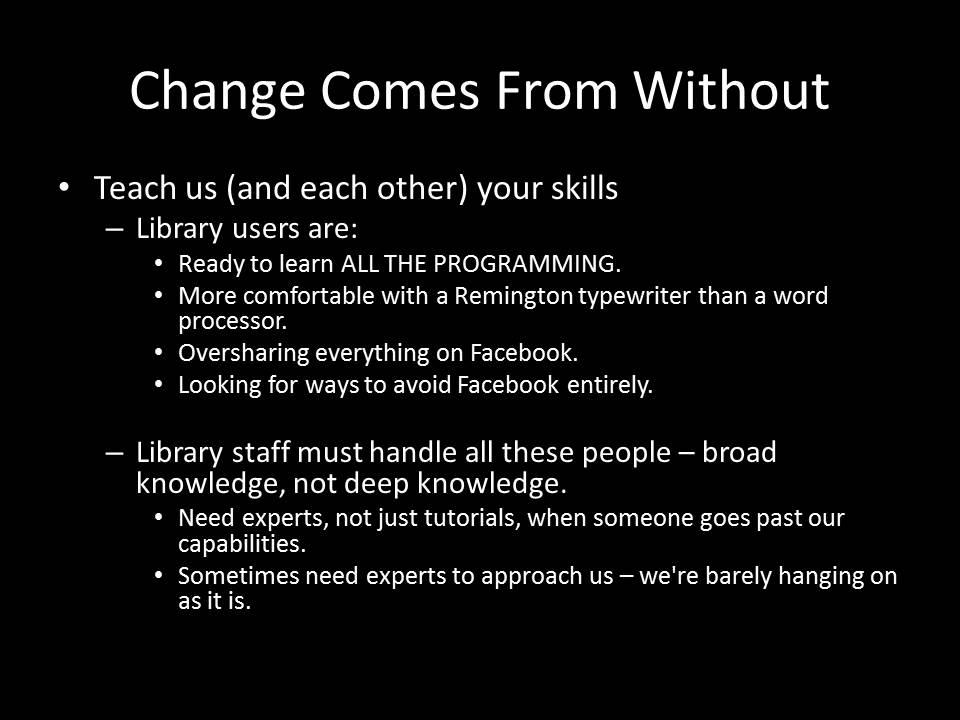
If you're not exhausted yet, or those other two ideas didn't really appeal that much, the library needs you to impart your skills to other members of the community, but also to the staff. In public libraries, we serve both the most up-to-date gadget wizards and people who are far more comfortable with a manual-action Remington typewriter than a word processor.
Here's another secret of the public library: The staff probably doesn't know enough about enough to actually be knowledgeable about everything. However, we're really good at being able to find that knowledge quickly and accurately, whether in printed or electronic form. Search engines are great at returning results, librarians are great at returning information. The algorithms can sort spam from wheat from chaff, but the people can select which of the results will be most useful at that moment in time.
Knowing how to find knowledge, however, is different than having that knowledge at hand, and is very different than the knowledge that comes from doing something for many years. Most of us can cook from recipes, myself included, but if you handed me a bunch of ingredients and put me in a kitchen, saying, "I'll see you in an hour for something delicious", if the food was edible by the time I was done, I would call the whole thing a success. I don't have the knowledge and practice that allows me to see complete dishes from ingredients. Similarly, if you put me in a room with a computer and a tutorial for a language and asked me to build a complex program, I'd try, but I don't think it would be very elegant. If the program ran at all. A librarian's expertise is in finding things that are organized in a system (preferably a logical one), and in having a broad base of knowledge to be able to get people started on their own pursuits and endeavors. Passionate people who want to learn more or hone and perfect their craft, however, will rapidly outstrip the expertise that librarians have, unless the librarian is equally as passionate and expert at that thing. The likelihood of that, however, is tempting the Random Number God in ways that rarely end well.
For this aspect of becoming an open-source institution, we need from you a willingness to teach or mentor or be there as a peer advocate. If you have a computer users' group that meets in library space regularly, invite one of the staff in during a meeting to see what's going on – if the library knows what you are doing and when you meet, they can begin to see you as more than just a scheduled appointment on their meeting room calendars. You become a resource that can be tapped to help someone else. Or, if the library wants to put on a program, they may ask you to provide expertise to shape and perform a program that people will get a lot out of and want to come back for more.
In some libraries, the staff will approach you and try to get to know you proactively. In a lot of other ones, the staff will need you to approach them, because they're already pressed for time as it is between collection work, public service at the branch, outreach to the community, fiscal decisions, programming, and the work of the library that goes on away from the places the public sees. They want to be engaged with all of you, collaborating with you, and trying to make their space and collections the very best they can be for you (and everyone else). If your public library isn't actively trying to recruit you, volunteer yourself to them.
Help us design our systems of the future
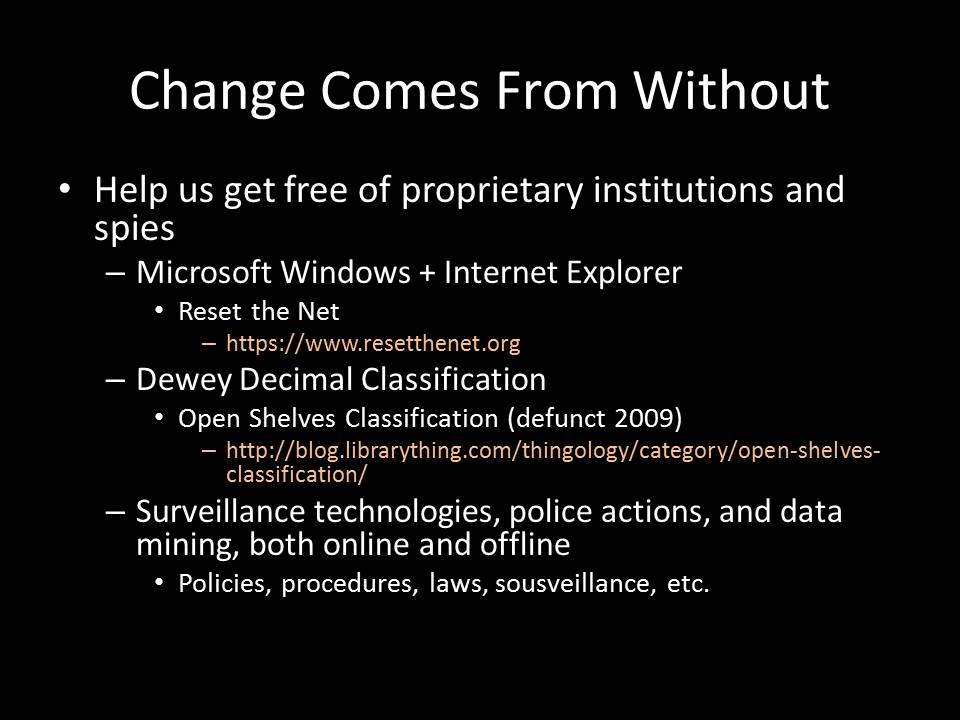
Koha, Evergreen, and other open-source ILSes are a good start to getting public libraries into full citizenship in the open-source world. Getting Linux and open-source programs and operating systems on all the computers and servers in every public library all around the world is a good start to getting public libraries into full citizenship into the open source world. Pushing for the use of TOR, HTTPS Everywhere, ad blockers like uBlock Origin, NoScript, and other add-ons and privacy protection measures in your public libraries is a good start to getting public libraries into full citizenship into the open source world. Advocating with ideas like Reset The Net is a good start to getting the public library and community to think heavily about systems, software, and privacy. These are admirable goals, and if that's where your talents and advocacy lies, then we're more than happy to have you pushing us in that direction. If you want to code up the new killer app for libraries, to make our systems and technology run better, and to give us software options to use that are free, open source, easily extensible (for a given value of "easy"), and have a structure in place to support us and train us on the open source software we have, we'll happily have you.
We need more than just technology, though. Even if we are freed of proprietary technology to the nth degree possible, we still have institutional structures, policies, and procedures that need to be opened up and examined. Many public libraries still use the Dewey Decimal System, and pay the proprietary fee to OCLC for it, even though Dewey is awful in so many ways, because it's a fairly easy system to implement, with a regular method of finding and classifying items under its purview. The alternatives are things like BISAC (which is how bookstores lay out their wares), which groups things in similar categories close to each other, but doesn't necessarily make it easy to find groups of materials on one specific subject without browsing the general area they're housed in, or the Library of Congress system, which has become the go-to system for academic libraries due to its infinite extensibility, but is an ad-hoc system at best, which can result in the problem of like things not being near like things, making it less likely for a researcher to find all the possible relevant materials on their subject. Plus, LoC is expansive - to cover all the possibilities would need a space the size of most academic libraries.
It would be lovely if there was an Open Classification Standard for all forms of materials, based in open-source, freely-available ideas like FRBR and FRAD, using an open and freely available standard to generate machine-readable records, and, most importantly, that makes freely available the process by which a material receives its classification. There was an attempt to start with this, the Open Shelves Classification, although it appears to have died down in 2009. Still, with sufficient people, and especially those with experience working on community-driven projects, the pieces of the first project could be revived and used, or their remains harvested for a new effort. It will take a big group to handle all of the moving parts involved, from developing the classification rules and symbols, the documentation that would accompany those rules and symbols, the procedures for classifying, the structure of a compliant record, the underlying philosophy, and to bring the idea into existence and promote it to libraries of all types. All of these goals would work best if undertaken in conjunction with libraries and librarians, with the ultimate end goal of a finished classification system freely available to all, made by an open-source community. Organizers of big projects can contribute their expertise in getting deliverables and managing lots of people, enthusiasts can draw new people in, keep the morale of those working on the project high, and run Kickstarters for funding. Coders and machine thinkers can help structure the system to be logically consistent and understandable to both machines and humans.
The benefits of a big project like this are immense. A public library can save a lot of money if they don't have to pay for the seats to Windows, the seats to OCLC, and the seats to the organizations in charge of the RDA Toolkit. Those building and classifying their own collections and libraries can create records that could be freely shared, and programs that could search such shared collections and coordinate their lending and use. The system itself could adapt and extend, so as not to get caught in a situation where an entire classification level is functionally dedicated to Christianity, with a very small element for non-Christians to live in, or to be able to redefine and rework itself so that any artifacts of a particular time's thinking can be smoothed out and refactored to match the mindset of the future. It would be the work of a lifetime – maybe several lifetimes, but the librarians and communities of the future would thank you profusely for giving it to them. De-coupling the institution of the public library from the for-profit companies that hold the keys to various systems will help the public library stay strong and able to adapt to the needs of the future.
We also need people who are skilled with privacy and security issues to help us stay informed about the latest ways that governments and private corporations collect and mine data on our daily activities. We need information about methods that have been developed to obfuscate, confuse, or prevent the disclosure of our personal data to those entities. Much of this will be software-focused, because we do most of our disclosures on-line these days, but we also need people who can teach us how to spot social engineering, help library administrators and boards write and enforce policies that provide maximum protection of our members and a smooth experience with the library, and help all people fight for their rights to own digital things, rather than just having licenses to use them. We need people who can help us translate EULAs into human, who can show us how to spot surveillance cameras, how to maximize the likelihood that the police will not attack us for peaceful protest, and how to effectively make changes in our government when it does things in our name that we don't approve of. An open-source library can house all of these things and more, and fiercely advocates on behalf of its community against those who would take away its fundamental freedoms.
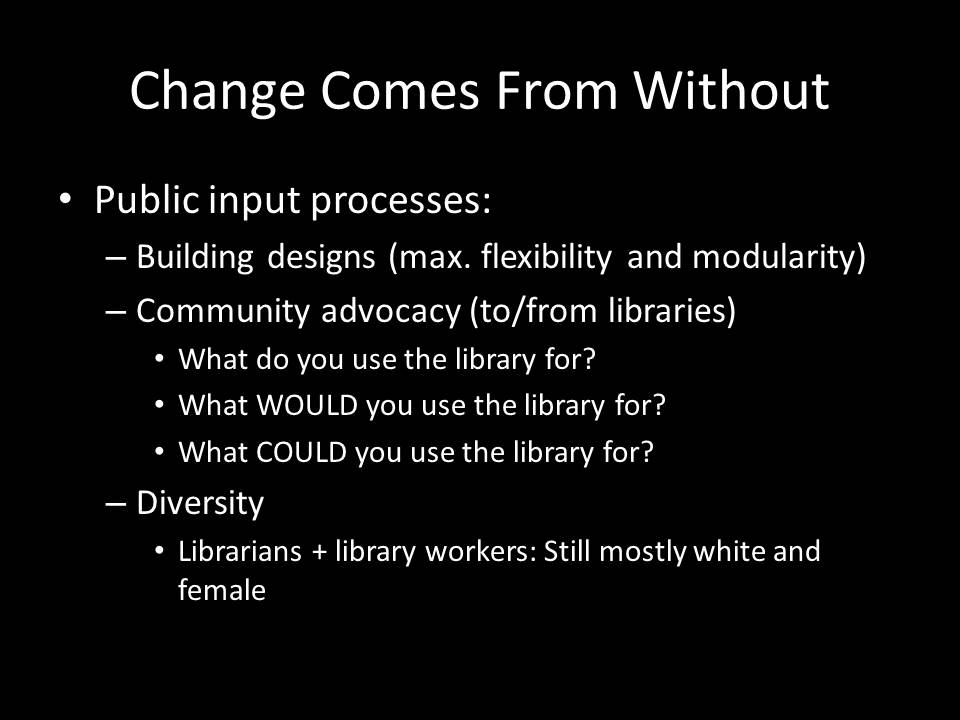
We need libraries to be built (and retrofitted) so that they can be modified on the fly. We need suggestions from the community that say "Hey! I want to be able to run a small business using library resources – not just books on business plans, or resources on improving my pitch talks, but actual, physical space and experts that I can use for my business." Creative people can use the space as a studio for working on their art, music, or other projects. Fabricators and makers can use their tools and the space to create stuff, which they can sell elsewhere. People who want to read can have quiet spaces to read, in stark contrast to all the other activity going on in the library. If necessary, or for kicks and giggles, the library could be turned into a giant game board or mini-golf tournament on the fly. Since buildings are a giant investment for libraries, we need community members to help steer the design process so that we build libraries not just of the future, but that will continue to exist in the future without needing to be torn down or remodeled at great expense. We need community members to tell us what their ideal public library would be able to do and look like, so that the design isn't stuck in the past or caters only to one use. Public librarians are great at building buildings that work for public librarians. We're not that great about building buildings that the public will use.
We also need advocates in our communities. A pitch from the public library about how awesome the library is might work for people who are looking specifically for the things the library is talking about and offering, but for people who aren't specifically looking for what we're offering, a library pitch usually has no effect. Even though someone might actually need what we're offering. People have stereotypes of what goes on in public libraries and what public libraries do. For soem people, I wonder if it isn't because their last meaningful experience with a library was before they turned twenty-five. How many of you stopped going to any library after college? And then possibly picked it up again when you had children come into your life? Or when you had a major life-changing event and you needed to rely on the free resources available at a public library?
There's a really big group of people who could use the public library, and who probably should use the public library, but aren't. And public libraries are notoriously re-active to change in the society around them, rather than pro-active about anticipating them. A fairly recent example, as libraries go, is children's services. While free public libraries, in one form or another, have been around for a very long time, the idea that children might also benefit from the public library is, going by Anne Carroll Moore's tenure at the New York Public Library (1906-1941), barely out of its own adolescence. From there, the idea of the "young adult" and need for their services has only been around for half of children's services (YALSA, the division of the American Library Association that handles this, was formed in 1957). After that, the digital explosion that started with personal computers, became worldwide with the World Wide Web, and continues with our increasingly powerful and small gadgets and computers has tossed everyone overboard to sink or swim. Public libraries have finally, several decades after the beginning of the World Wide Web, mostly worked our way through the basics of the digital revolution. The problem is, then the Maker movement arrived, hot on the heels of ideas like gaming in libraries, and public libraries started waking up to the reality that the programming options they were putting on were highly parent-focused (e.g. Story Time), highly book-focused (e.g. book clubs), and highly school-focused, with buildings and systems that reflected this ingrained bias. The new world requires flexibility and agility in thinking about all aspects of public library service. To be an effective public library, we need constant feeds of input and the ability to tap the community on request to meet demands.
Examining just one facet of this new world, YALSA put out The Future of Library Services for and with Teens: A Call to Action on January 8, 2014. danah boyd's It's Complicated examines another of these multiplying facets.
Your abilities may be best put to use convincing the community around you that there are necessary changes incoming to your area, and that the library can help with adapting to those changes. Or you can tell your friends that have difficult questions, want to learn new skills, or are otherwise trying to problem-solve that the public library has stuff on that (or can get it in a pretty short time). Or you can talk about the only free space in town to meet and do work. You can put your Slytherin skills to use and build a coalition strong enough to break inertia and force change, both in the public library and in the community.
Finally, the public library needs more diversity in our staffing as well as in our collection. The minimum degree for a librarian is a Master's degree, which takes two years of graduate school to obtain. Unsurprisingly, that often places the profession out of reach for many. Some schools are starting to react to this reality by offering undergraduate courses and degrees in library sciences. But even then, a four year degree can be prohibitively expensive. We not only need diverse library workers, we also need to figure out ways of lowering the barriers to entry for the profession, so that we can more accurately represent the communities that the public library is part of. Otherwise, the profession will continue to remain mostly white and female, a tiny sampling of the real diversity of library communities
We need your help to build the libraries of the future. Otherwise, we'll just be building more of the same.
The Library Can Be An Open-Source Institution
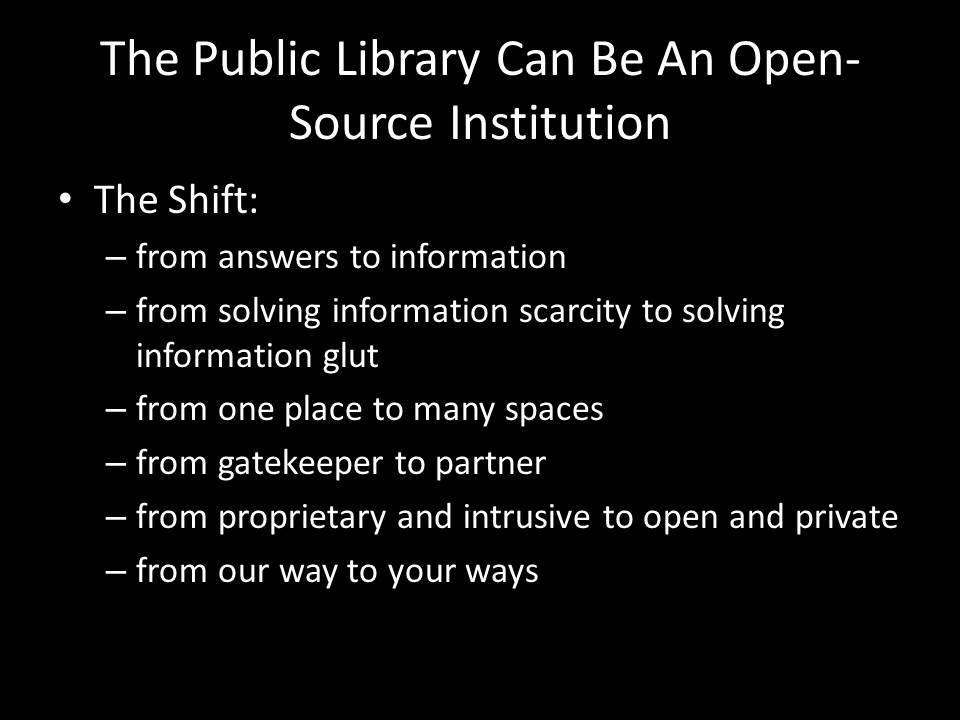
Public libraries are remarkably well-suited to the task of becoming fully and unreservedly open-source institutions. In the past, they solved the problem of mass availability of information by selecting and curating collections intended to answer general and specific questions. Because of their nature as a tax-supported institution, public libraries also are solving questions of how to help those with limited resources by providing entertainment collections, materials to children and teens, specialized tools, programming, collaborations, and Internet access for free. The system worked in the past because those needs were the most important ones in a literate and productive community.
In the Internet age, however, mass availability of information has shifted from a problem of scarcity to a problem of glut. Public libraries and librarians are now required to use the parts of their training that involve sifting, sorting, and selecting material to provide maximum information per unit. The problem of providing for those without hasn't gone away, and in the recession, became significantly more important than it had been before. And there's significant commercial competition for content delivery that didn't exist in the pre-Internet age. Public libraries still have problems to solve, but they are not the same problems that they were. Instead, public libraries have to solve questions of mass surveillance, decreased privacy and security in software programs and Internet-based services, and problems of mass availability of tools that their community needs to be able to succeed.
The open-source public library of the future is one that runs on its community, taking their inputs and producing collections, programs, spaces, philosophies, and systems that meet the needs and aspirations of those communities, and do their work in the places where the community is present. Without that community, a public library is what the librarians think the community wants, and librarians aren't representative enough of their communities to accurately predict what the community actually wants.
Right now, most public libraries are somewhere in the middle of this pivot, tentatively testing the waters, or in about neck-deep and floundering, looking for a way to shore. Some of them refuse to get in, believing that these problems will go away on their own. A few libraries dove in and are ready to swim to the next shore. The majority, though, are looking for a way across, and the open-source community can lend a hand in getting them there, with expertise, with cool software programs, and with advocating for and defining expectations of what a public library means, so that the public library can, in turn, shape itself to meet those expectations as much as possible.
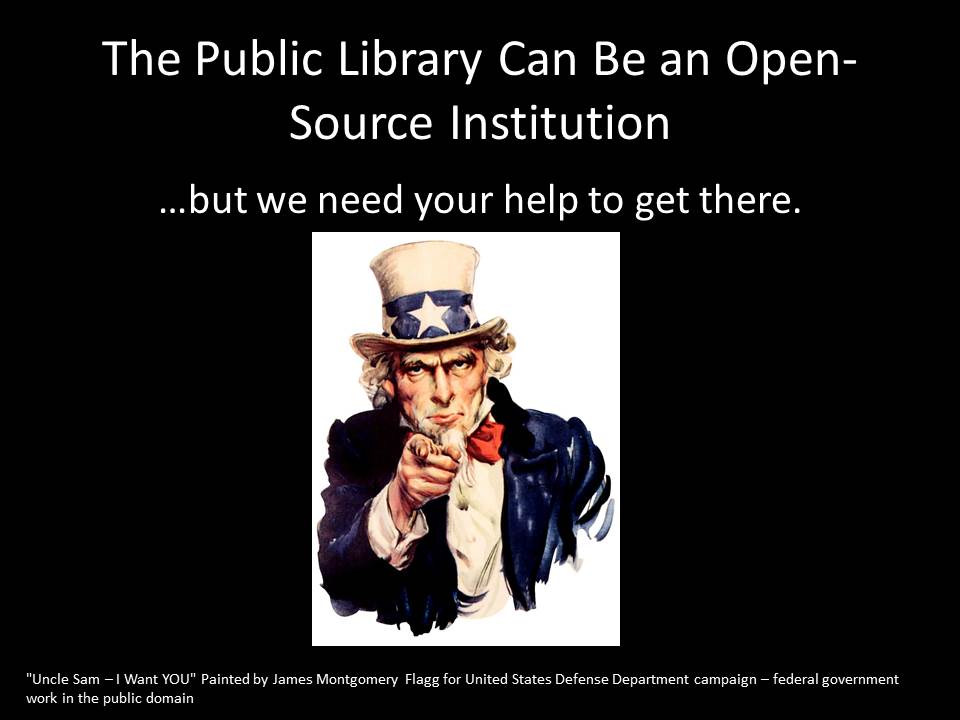
The public library can be an open source institution. But we need your help.